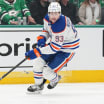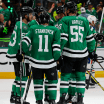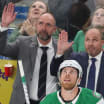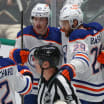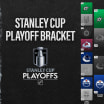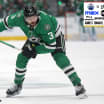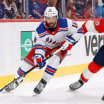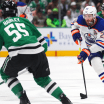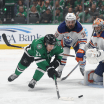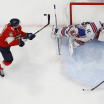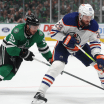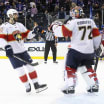Chara's role declining for Bruins entering Game 4 against Lightning
43-year-old defenseman in 'passing of the torch' with McAvoy taking No. 1 spot
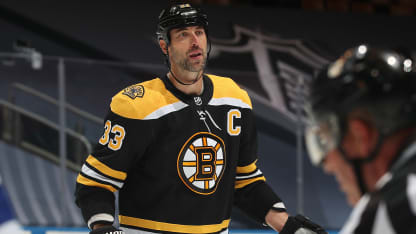
The Boston Bruins defenseman has always taken pride in getting the most difficult assignments, in defending with the lead and without, in playing on the power play and on the penalty kill and being the strongest and the best. That pride has defined him, just as it has most exceptional defensemen, those captains, Stanley Cup winners and Hall of Famers.
Which is why so many of them have struggled as they have gotten older, as their impact has lessened and have found themselves watching in some of the situations where they once excelled.
"You feel like you still have it. You still have that compete in you," said retired defenseman Hal Gill, who had a 16-season NHL career with six teams. "In your heart, you know the thing that's going to help you, help your team win, is playing against those top forwards."
RELATED: [Complete Lightning vs. Bruins series coverage]
And though Chara himself has not admitted, at least publicly, to such struggles, it's a common theme for those who are facing the end of their career.
It's what they see when they look at Chara's situation, at his diminishing minutes and role for six seasons. The 43-year-old, the oldest player in the NHL and captain of the Bruins, is no longer being used in the spots he once was, even as he helps the Bruins chase another Stanley Cup championship.
He also remains unsigned for next season, an impending unrestricted free agent. While the past two seasons he has signed one-year contracts in March, he has not done so yet this year. The defenseman has indicated that he is not contemplating retirement, saying that he would like to remain in the present, but he has also not definitively stated that he will play in 2020-21.
Chara originally signed with Boston as a free agent prior to the 2006-07 season and played an NHL career-high 27:33 per game. He scored 43 points (11 goals, 32 assists) that season, beginning a stretch that saw him score 40 or more points in his first seven full seasons with the Bruins.
This season, he had 14 points (five goals, nine assists) in 68 games with an average ice time of 21:01. During the postseason, he is averaging 19:30 of ice time per game, which is fourth among Bruins defensemen and the lowest average of his NHL playoff career, which stretches across 193 games. Chara averaged 29:32, the most of his playoff career, in the 2013 Stanley Cup Playoffs when the Bruins advanced to the Stanley Cup Final before losing to the Chicago Blackhawks in six games. In 2011, the season Boston defeated the Vancouver Canucks in seven games to win the Cup, Chara averaged 27:39.
The Bruins trail the Tampa Bay Lightning 2-1 in the Eastern Conference Second Round. Game 4, scheduled for Friday, was postponed and will be played on Saturday (Noon ET; NBC, SN, TVAS) in Toronto, the East hub city.
"On the ice you're seeing a bit of the passing of the torch now," coach Bruce Cassidy said. "Charlie [McAvoy] is playing more minutes, playing in all situations, things that [Zdeno] did years ago in his prime, so that's an interesting dynamic as well -- how they help each other."
But even though Chara and McAvoy have formed a working relationship that has bolstered the Bruins' chances of winning another championship with the captain before he eventually retires, being supplanted can be hard to accept.
"I think my focus is obviously playing well defensively," Chara said. "I do my best for the team whether it's offensive-zone face-offs or defensive-zone face-offs. I can't really tell you if my role is going to change. I'm always going to do my best, regardless of where I'm put in."
But, as he said in an interview a year ago, he has always taken the utmost pride in playing against top lines, against the most skilled players, against the best.
That doesn't always happen now for Chara, and it can be hard.
"Your demands of yourself, of always being the No. 1 guy, getting sent out to every shift, no matter what the score is or at the end of the game, if that doesn't happen anymore that really battles with your confidence," said retired defenseman Dennis Seidenberg, who won the Stanley Cup with Chara in 2011.
"You have always in your mind, you're the No. 1 D and when young guys come up, you don't want to acknowledge that those young guys coming up, maybe they're a step quicker than you, maybe they have more energy than you. Your mind doesn't grow older, you're still the same, but your body does -- even if you don't want to admit it."
It's that battle that's hardest to wage for an aging defenseman, especially one who has spent a career being put in the very toughest situations, playing the most important minutes.
"What gets tougher is getting old," Hall of Fame defenseman Paul Coffey said. "You can't do the things you used to. But a guy like Chara, he's a good pro. He accepts it. Some guys don't. The game is too good a game, filled with too many good people, that you can't make it about you. It's never about you."
It happens gradually or all at once -- the assignments change, other defensemen take on the opposing top line, the power-play minutes drop and then disappear. It did not start this season for Chara, but it might be most notable now, coming back after four months away from the game while the NHL season was paused March 12 due to concerns surrounding the coronavirus.
"I think he recognizes where he's at with his game," Bruins president Cam Neely said. "He certainly takes pride in playing in the National Hockey League and being the best player he can be. He's still a beast to play against, and we love him on the penalty kill, that's for sure.
"He's still very, very hard to play against. But he understands where he's at."
Chara is playing an average of 3:14 per game in shorthanded situations this postseason, the most on Boston. But he no longer sees significant power-play time; he played 3:36 on the man-advantage in 68 regular-season games.
"I think he's a smart enough person to understand where he fits," Hall of Fame defenseman Brian Leetch said. "I think it was hard for him four or five years ago when they were transitioning the power play and moving different guys in. … I think that was the time probably where he had to realize where his career was going and that there were guys that needed to move in or who were better for different roles."
What has been even more notable of late is not only that Chara has been surpassed by McAvoy -- who, at 22, is 21 years his junior -- as the Bruins' No. 1 defenseman, but that Cassidy has elected to send out another pair, mostly Torey Krug and Brandon Carlo, against opposing top lines on occasion. McAvoy leads Boston in playoff ice time at 24:04, with Krug second at 21:38 and Carlo fifth at 19:40.
Chara is still relied upon heavily in certain situations, especially when the Bruins have the lead or are on the penalty kill. In Game 1 against the Lightning, Chara played a shift of 2:14 during a second-period kill.
But it's not the same as being the go-to guy in every situation.
Part of the frustration, Gill said, comes because as a defenseman ages, he gets savvier, about tendencies, angles, ways of anticipating. He understands how plays develop, gaming them out like a grandmaster in chess, just as his body is slowing.
"You get smarter as you go," Gill said. "That's the sad part about a defenseman is, you're deteriorating physically, but mentally you see the game a lot clearer and a lot easier. You know where the easy outlet pass is and you know how to talk a guy into the corner and take him away and take time and space away. I think he's done a pretty good job of doing that."
This is, after all, not the first time Chara has had to adapt. He came up in an era that was much more permissive for players of his size and strength. Chara had to mold his game to a time of younger, speedier forwards, of less clutching and grabbing, of rule changes that limited some of what he seemed particularly well suited to do.
He made it work. Just like he's making it work now, with fewer minutes, a changing role, a new No. 1 defenseman in his place.
"It's a hard pill to swallow," Gill said. "But at the same time you're saying, 'I'll do whatever,' especially on a good team that he's on. 'I'll do whatever it takes to win.' He's a captain; he's a leader. He can't revolt. He's not going to do that. He's got to give the team whatever he can."
